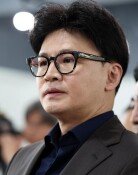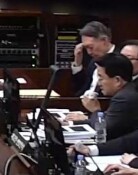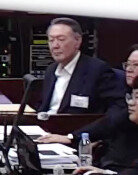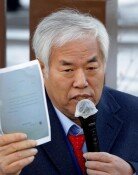Foreign Funds Leaving Korea?
As the call rate of the U.S. has almost overtaken that of Korea, foreign funds that entered Korea for high profits are withdrawing their investments. Against this backdrop, some are raising their voice that the Monetary Policy Committee of the Bank of Korea (BOK), which will be held on May 12, should raise the call rate to prevent further capital outflow. However, most experts predict that the BOK will freeze the call rate as it is too early to say that the Korean economy is on the solid path to a recovery.
Capital outflow-
According to the securities sector, four major Korea-related funds including General Emerging Market (GEM), Asia X Japan, International, and Pacific Region, began to withdraw capital from Korea in earnest after the U.S. raised its call rate to 2.75% on March 23rd.
The 2.75% U.S. call rate is significant in that the real interest rate, which takes inflation rate into consideration, of the U.S. turned positive.
The net capital outflow by Korea-related funds, including the four major funds, from March 24 to March 30 amounts to $1.1 billion. Since then, the outflow trend has continued with exception of April 7 to April 13 and five out from the past six weeks, including the past three consecutive weeks with recorded net outflow.
Analysts said that the net amount of outflow is estimated to be less than $1.1 billion but the outflow trend is prominent.
The same trend was witnessed in 1994 and 1995 when there was massive capital outflow from emerging markets including Korea as the real interest rate of the U.S. turned plus, said Kim Hak-gyun, a senior analyst of Good Morning Shinhan Securities.
According to foreign exchange dealers, among the funds that withdrew from the Korean market recently are short-term money that entered emerging markets to gain high profits by cheap US dollars with low rates of the U.S.
With regard to the capital outflow, the Samsung Economic Research Institute pointed out that it cannot rule out the possibility that capital outflow might create a worst scenario where stagnant domestic consumption causes a low interest rate, which would in turn create an additional bubble in the real estate sector, in its report on interest rate hikes in major countries and its implications
Response by the BOK-
Currently, the call rate of Korea is only 0.25 percent higher than that of the US. While the U.S. call rate was raised to 3.0 percent on May 4, the Korean call rate remains at 3.25 percent since November 2004.
However, it seems that the BOK is not shaken by the figures.
Park Seung, chairman of the BOK, said on April 7, Though the U.S. call rate may overtake the Korean call rate, it is not a matter of concern. What matters is the extent of the capital outflow, as Korea still has to encourage overseas investment even when there is capital outflow.
The remark is interpreted that the BOK has to tolerate a certain extent of capital outflow in order to prevent a surge of the won against the US dollar, as exports are leading the Korean economy amid stagnant domestic consumption.
Experts predicts that the BOK will freeze the rate-
Besides the possible outpace by the US dollar, there are many factors that might raise the Korean call rate. According to conditions of the service industry in March, a report released by the National Statistical Office (NSO) on May 6, the wholesalers and retailers sales turned positive after nine months of negative growth, signaling a possible recovery of domestic consumption. The hike of real estate prices also raises the possibility of a rise in the call rate.
However, most experts agreed that the call rate will remain the same until the end of May or longer.
Researchers of private economic research institutes said, An attempt to cool the real estate market by a raise in interest rate will have a negative impact on companies in difficult situations and indebted households. The BOK will watch the May 4th real estate policy by the government for the time being.
A raise in interest rate amid signs of economic recovery might accelerate capital outflow as foreign investors worry about a cool down of the Korean economy, said Koh Yu-seon, a senior analyst of Dongwon Securities. The BOK will not raise the call rate in the first half of 2005.
Kyung-Joon Chung Wan-Bae Lee news91@donga.com roryrery@donga.com







